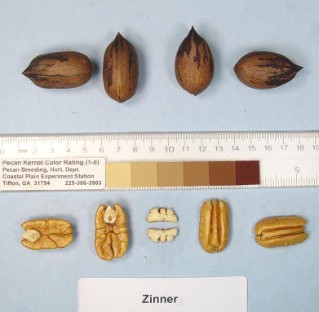By Clint Thompson

Sustainable pecan production starts before the producer plants their tree. The right variety selection could lead to reduced chemical sprays for scab disease, which could save the producer time and money over the course of their pecan trees.
Picking varieties like Zinner and Avalon could have positive ripple effects for growers trying to overcome high input costs.
“That cost of production, anything you can do to reduce that is going to help. For a new grower, planting the right variety is going to give you the best advantage,” University of Georgia Cooperative Extension pecan specialist Lenny Wells. “The cost of controlling pecan scab, our No. 1 disease, is about 12% of the annual budget of growing pecans.
“You want to plant varieties that produce good quality and that have good scab resistance. That’s really going to be the key.”
What is Scab?
Scab is a fungal disease that infects the leaves or nuts of pecan trees. If it affects the nut early enough, scab can cause the pecan to blacken and fall from the tree. Some growers may spray between 10 and 12 times during an average year to fight scab, depending on how much it rains during the summer. Scab thrives on trees that have received moisture.
Producers should stay up to date on their management sprays amid the increased rainfall this summer. Consistent rains in June have replenished the soil moisture and alleviated the dry conditions across the Southeast. But they have also made pecan trees vulnerable to scab pressure.









